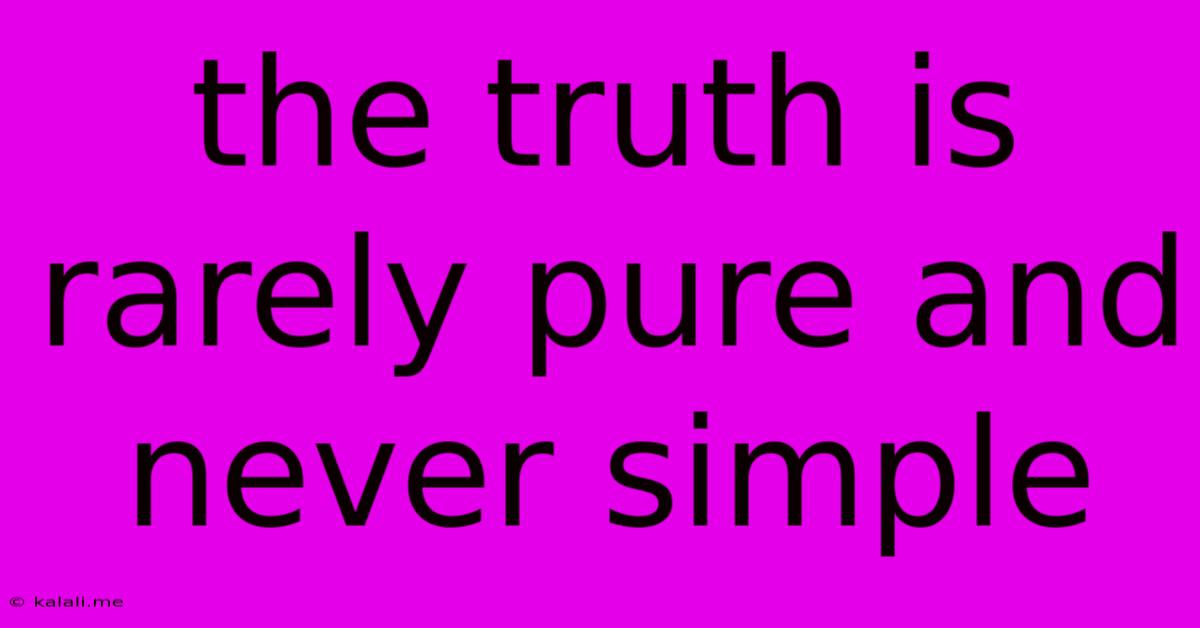The Truth Is Rarely Pure And Never Simple
Kalali
May 19, 2025 · 3 min read

Table of Contents
The Truth Is Rarely Pure and Never Simple: Unpacking Wilde's Provocative Statement
Oscar Wilde's famous assertion, "The truth is rarely pure and never simple," resonates deeply even today. This seemingly simple sentence encapsulates a profound understanding of human nature, morality, and the complexities of reality. It's a statement that challenges our ingrained desire for straightforward answers and forces us to confront the messy, nuanced truths that often lie beneath the surface. This article will explore the various facets of Wilde's observation, examining its implications for personal relationships, societal narratives, and our understanding of justice.
The Subjectivity of Truth: The first layer of Wilde's statement speaks to the subjective nature of truth. What one person considers true, another may vehemently deny. Our individual experiences, biases, and perspectives shape how we interpret events and information. A single event can have multiple "truths," depending on the narrator and their point of view. Consider a heated argument between partners; each individual will likely have a different version of what transpired, both believing their account to be the complete truth. This inherent subjectivity makes the pursuit of a singular, "pure" truth an often impossible task.
The Complexity of Human Motivation: Furthermore, Wilde points to the multifaceted nature of human motivation. Rarely do our actions stem from a single, easily identifiable source. We are driven by a complex interplay of desires, fears, and subconscious impulses. Attributing actions to a single, simplistic motive oversimplifies the human condition and ignores the intricate web of factors at play. For instance, an act of seemingly selfless charity might be motivated by a desire for public approval, a need for self-validation, or a combination of factors far removed from pure altruism.
The Influence of Narrative and Perspective: Our understanding of truth is heavily influenced by the narratives we construct and consume. Media, history books, and even personal anecdotes shape our perceptions of events, often omitting crucial details or presenting biased interpretations. These narratives, while potentially helpful in providing a framework for understanding, can also obscure the full picture. The "truth" as presented in a news report, for example, might differ significantly from the lived experiences of those directly involved. Unpacking these narratives and examining alternative perspectives becomes crucial in approaching a fuller, more nuanced understanding.
The Elusive Nature of Justice: Wilde's statement has profound implications for the pursuit of justice. Legal systems often strive for a singular, objective truth, yet the complexities of human behavior frequently defy such simplification. Eyewitness testimonies differ, motives are ambiguous, and evidence can be open to interpretation. The pursuit of justice, therefore, often involves navigating a labyrinth of conflicting accounts and ambiguous evidence, revealing that the "pure" truth is often unattainable. The aim becomes achieving a form of justice that acknowledges the complexities of the situation, rather than searching for an elusive, pristine truth.
Embracing Nuance and Complexity: Ultimately, Wilde's observation calls for a shift in perspective. Instead of clinging to the illusion of pure and simple truths, we should embrace the nuanced complexities of reality. This means acknowledging the subjectivity of our experiences, accepting the multifaceted nature of human motivation, and critically examining the narratives that shape our understanding of the world. By doing so, we can move closer to a more comprehensive and empathetic understanding of ourselves and the world around us. The journey toward understanding "truth" becomes one of continuous questioning, exploration, and a willingness to grapple with the inherent ambiguities of life.
Latest Posts
Latest Posts
-
Do Stop Start Batteries Need To Be Programmed
May 19, 2025
-
What Goes Up And Down But Never Moves
May 19, 2025
-
Reduce Embedded Image And File Size In Illustrator
May 19, 2025
-
Make Google My Homepage On Iphone
May 19, 2025
-
When Was The Last Time The
May 19, 2025
Related Post
Thank you for visiting our website which covers about The Truth Is Rarely Pure And Never Simple . We hope the information provided has been useful to you. Feel free to contact us if you have any questions or need further assistance. See you next time and don't miss to bookmark.